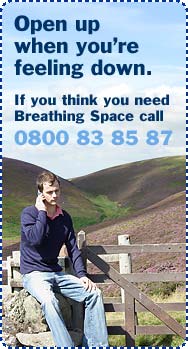Getting help

This section is about how to access help. It is also about getting the best out of the services that you get in contact with.
Remember that you are not alone and that one in four people will experience some kind of mental health problem in the course of any given year. The vast majority of people go on to make a full recovery whilst others learn to manage their health problems and lead full and active lives.
What help may be available to me?
Talking to a friend – You may find it helpful to share how you feel with someone close to you and that you can trust. A partner, relative, friend or colleague are useful sources of help and support and for many are the first points of contact for discussing problems. You could also talk to a teacher or a spiritual advisor such as pastor, priest or minister etc.
Talking to your GP – If you have a mental health problem normally your first point of professional contact will be with your own GP. The GP may assist you with the problem directly or refer you to another agency which provides more specialist support and treatment. Your GP is often the key person in helping you get a referral to another agency or service. Remember your GP is there for you and there are no issues which are too sensitive to be discussed with him/her.
Contacting a phoneline – Most phonelines will provide a listening service, give information and advice, provide emotional support and point you in the direction of other services. They are often free phone services which are staffed by trained volunteers or employees. They are confidential and often anonymous in that you are not asked for your name or any contact details. Some phonelines such as Childline or Breathing Space target a specific group of people, whilst others are more generic such as the Samaritans. You will normally find the telephone numbers of phonelines in Yellow Pages or in your local telephone directory.
Taking part in a self-help group – these are informal groups that discuss shared problems, such as a mental or physical illness, addictions, phobias, self-harm and personal crises and life changes. Alcoholics Anonymous is the oldest and best known. They provide a useful forum for listening, support and advice. If you want to find out if there is an appropriate group in your area contact your local Community Health Care Team (CMHT) your health centre will provide the telephone number or you will find it in your local telephone directory under health board services.
Talking to a counsellor – It can be a great relief and therapeutic just to talk to a sympathetic, understanding, uncritical listener; this could be a friend, a relative, a volunteer or a professional. Professional counsellors are experts in the field of psychotherapy (talking therapy) and may specialise in helping those with a wide range of problems such as drug addiction, anxiety and sexual abuse etc. Some counsellors have their own practice whilst others may work for a recognised agency or counselling service. Your GP or CMHT should be able to recommend an appropriate counsellor or counselling service. Some independent counsellors may charge a fee for their services.
Contacting your Community Health Care Team (CMHT) – CMHTs support people with mental health problems living in the community. They also support carers of a person who has a mental health problem. They are usually based at a hospital or community health centre. Some teams provide a 24 hour service so that you can contact them at anytime if there is a crisis. Your local team can be contacted by telephone and the number will be available from your telephone directory normally listed under health board services.
A CMHT will normally consist of the following professionals:
- Community Psychiatric Nurses – CPN'S will work with you to determine your needs. They will assess, plan and deliver care and monitor medical care and treatment. They can visit you at home and provide support and treatment as appropriate
- Psychiatrists – having a Psychiatrist involved in treatment planning may be required for more severe mental health problems where a diagnosis is required and treatment protocols necessitate the use of medicines. In order to see a psychiatrist as with any medical specialist working in the NHS, you will need to get a referral from your GP. If you wish to see a non-NHS psychiatrist your GP may hold a list of those who practice privately. Otherwise you can try contacting private clinics directly to make an appointment. Some psychiatrists may advertise themselves in your local yellow pages. It is always wise to discuss with your GP first before independently engaging a psychiatrist
- Clinical Psychologists – are highly trained psychotherapists, and they are expert administrators and interpreters of psychological tests (IQ tests, personality tests, brain functioning tests, etc.). They provide different forms of counselling and psychological treatments. Again, you may get a GP referral to a psychologist or possibly a referral may be obtained through your Occupational Health Service or through your school, college or university counselling service. You may also be able to see a psychologist privately and this should be discussed with your GP who will have a list of those who practice privately
- Social Workers – serve the healthcare industry in two primary capacities; as an advocate regarding facilities and resources such as finance, accommodation etc; and in helping to connect patients to local health-care resources, and sometimes as psychotherapists. Some social workers have specific responsibilities for mental health.
- Occupational Therapists - assess, rehabilitate and treat people using purposeful activity and occupation to prevent disability and promote health and independent function.
Note: Psychotherapies are better known as talking therapies. These may be used in combination with other treatments and are undertaken by trained therapists or counsellors.
If you need help right now, visit the Immediate Help page.



